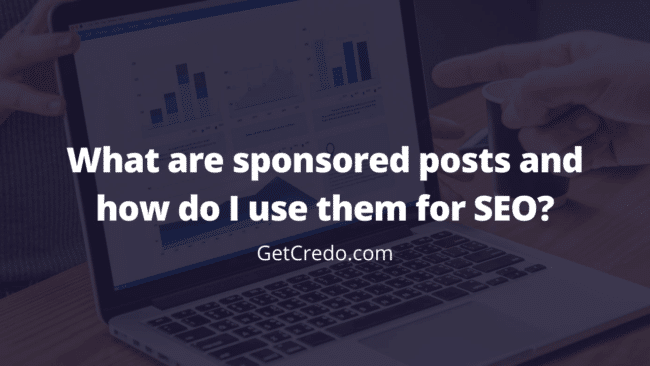What are sponsored posts?
Sponsored Posts are where your product or service gets reviewed or detailed in the form of a blog post (or social media post) by an influencer or popular website for a fee. Sponsored posts are a form of native digital advertising where your brand is showcased in a natural way without disruptive ads.

Sponsored Posts history
Sponsored posts have been around for years now and can be seen on blogs and social media platforms alike.
They can be seen and found in just about every and any industry you can think of from digital marketing to food blogging and everything in between.
They have recently gained more traction as the influencer marketing trend has exploded, giving room for popular influencers to review and showcase a business.
Sponsored Posts uses
- Circumventing bad organic reach and adblock: organic reach on social media is in the tank. Facebook organic reach has been declining year over year and reaching just a few percent of your audience is now the norm.
Even platforms like Instagram and Twitter have similar results.
This makes it tricky to reach audiences on social media without paying big money.
Even so, people are becoming less and less receptive to ads. It’s why tools like ad blocker have skyrocketed in usage.
Sponsored posts allow you to circumvent bad organic reach and ad blocking tools by producing a native advertisement on a popular website.
By paying for a sponsored post, your brand gets showcased to all viewers of the site without it feeling like a direct ad.
- Building brand awareness: building brand awareness is becoming tough on traditional platforms like social media. Reaching your existing audience isn’t easy, let alone cultivating new ones.
Sponsored posting aids in building brand awareness and establishing your company as a solution to common problems in a given niche.
Since it’s coming from third parties and not being written by your own company, it comes off as more trustworthy and genuine than simply self-promotion junk that users click off immediately.
- New audience targeting: lastly, new audience targeting is a huge benefit of sponsored posts.
For instance, if your company sells SEO tools and services, getting a sponsored post on a popular SEO blog can help you reach a new audience that is primed for your services and tools. Otherwise reaching them would be harder and less direct than social media and PPC.
Sponsored posts have the benefit of allowing you to hand-pick audience targets whereas ads produce more ambiguous audiences.
- Link Building: another great positive of sponsored posts is link building. By being mentioned on another popular site in your niche, you can acquire links that are high in domain authority. The anchor text can often be heavily customized whereas guest posts won’t let you build links, especially promotional ones.
Sponsored Posts misunderstandings
- Sponsored Posts are not guest posts: Sponsored Posts are fundamentally different than guest posts, but the two are often either lumped together in the same category or confused as two of the same entities.
But, this couldn’t be farther from the truth. Sponsored Posts are native advertising. They are essentially detailed blog posts on a given website that explain your product or service from top to bottom. They show use-cases, case studies, reviews, and more.
But guest posting is simply writing a blog post for another website. And websites often pay people to write guest posts.
On top of that, guest posts aren’t native ads and they aren’t promotional. Guest posting is a blog featuring experts in their niche to write content that helps customers, not to showcase the ins and outs of a product or service.
Guest posts can actually be penalized by Google for being overly promotional or utilizing link-building tactics.
- Sponsored Posts aren’t mass advertising: one major thing that most people get wrong with sponsored posts is thinking that they are going to reach the masses and produce massive returns.
But that’s not true. Sponsored posts are best done on niche sites where the audience directly matches to your buyer personas.
For instance if you sell beginner SEO tools, you shouldn’t be paying for a sponsored post on expert SEO blogs. Despite being in the same category, that’s a major audience mismatch and a recipe for zero sales.
Sponsored posts aren’t mass market ads. They are highly specific and should only target sites that match your audience targets.
What do I need to know about sponsored posts and SEO?
Technically any links in a sponsored post are paid for directly, and thus they should use a rel=”sponsored” tag.
Here is an example of that from Google’s own documentation:
<a rel="sponsored" href="https://cheese.example.com/Appenzeller_cheese">Appenzeller</a>
As you can see, this is a tag that goes in the <a href=””></a> link tag and tells search engines that this link is sponsored and thus probably shouldn’t be counted for rankings.
So how are sponsored posts useful for SEO?
A lot of SEOs think solely about links, which is to their detriment. While link building is undoubtedly still a large part of SEO, a focus on just links is often to the detriment of a user’s web experience and a website will not rank as well as its competitors if links are the only focus around SEO.
Sponsored posts can be fantastic for SEO when used properly, usually to either do reputation management or to simply stack the search results with your content and therefore in your favor when someone searches for that topic. I have seen SEOs use sponsored posts to great effect in this way, effectively leveraging what we in the SEO world call “barnacle SEO” where your content or service is found on another domain.
So don’t think about sponsored posts as something to game for links. Think about them as a SERP and therefore world domination strategy.


